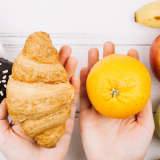7 Easy Tips for Keeping your Baby Cavity-Free

7 Easy Tips for Keeping your Baby Cavity-Free
Oral bacteria is passed from caregiver to infant. For this reason, avoid sharing food (pre-chewing), oral items, or rinsing dropped pacifiers in your own mouth, especially if you have dental restorations or a history of decay. Advise other caregivers that your child may encounter to do the same.
Keep your mouth healthy – chronic inflammation is linked to other systemic health risk factors, which can affect fetal health.
Chew sugar free gum, ideally xylitol based (e.g. Ice Breakers Ice Cubes, Spry)
Make it a goal to wean off night feedings prior to the eruption of your baby’s first tooth, should your child’s health permit it.
As your child grows, should you choose to offer juice, time the juice to coincide with a meal. Avoid offering juice if possible, especially between meals, and reserve it as a treat for special occasions.
Use infant bottles for water, breast milk or formula only. When traveling, we recommend bringing water, breast milk, or formula, as needed for your child’s age.
Fluoride toothpaste is recommended for all children, even those who cannot spit. Use a small amount (about the size of a grain of rice), smushed onto the toothbrush, and store toothpaste out of reach of children. Start off slowly, with nighttime brushing, and gradually build daily brushing into your child’s routine.
If your child has special dietary requirements (e.g. Pediasure, nasogastric tube) or medications (e.g. albuterol, vyvanse), we can help you manage oral health and talk about how best to deliver supplemental nutrition and medication to prevent decay.
Our goal is to instill healthy habits early on, to help every child remain cavity-free for life. Ultimately, if your child has decay, do not feel guilty. We are here to work with you as a member of your child’s healthcare team. Together, we can give your child a fresh start, and manage his or her disease going forward.


